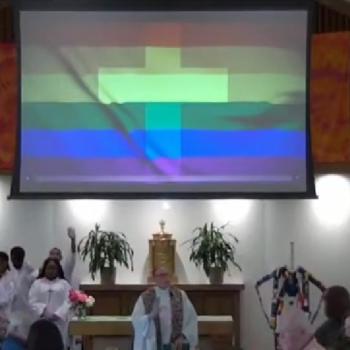The Catholic Church is headed towards schism in Germany. With the German Synodal Path and universal Synod of Synodality, the Church appears on course to schism in Germany. The present course the Church finds herself on recalls the words of Albus Dumbledore in Harry Potter and the Goblet of Fire:
Dark and difficult times lie ahead. Soon, we must all face the choice between what is right and what is easy.
In this article, I evaluate of the current state of the Church considering the German Synodal Path and the Synod of Synodality. The recent visit of the German bishops to the Holy See and the Working Document for the Continental Stage titled “Enlarge the Space of Your Tent” take center stage in this evaluation. Clearly, what transpired during the German visit and was presented in the continental stage of Synod of Synodality document reflects a Church in crisis, not only in Germany but also the universal Church.
In short, the German bishops were undeterred from their current course of dissent from Rome. Furthermore, the dissent reflected in the pre-synodal documents (and summarized in the continental document above) forebodes an extreme backlash of disappointment from those who hoped for a fundamental doctrinal change concerning human sexuality and women’s ordination. All this will eventually come to a head at the Assembly of the Synod of Bishops in Rome, in October 2023.
The Looming German Crisis
Sixty German bishops visited Rome in mid-November for their mandatory ad limina apostolorum visit. The Holy See hoped to curtail the German bishops’ “synodal way” towards schism in Germany with this in-person visit. Sadly, all hope for correction were dashed. The National Catholic Register reports of the meeting with senior Vatican officials and the German bishops:
Cardinals Ladaria and Ouellet then “frankly and openly” detailed how the German Synodal Way had become wayward. Cardinal Ouellet frankly called for a “moratorium.” The Germans flatly refused. Determined to continue, they plan to move ahead with those matters which are in their local authority. More profound matters for the universal Church will be forced by the Germans onto the agenda of the Synod of Bishops on Synodality next October.
And
The conflict between the German bishops and Rome is fixed, and it will heat up over the next year. The Holy Father’s synodal process on synodality for a synodal Church will now be entirely consumed by the German matter, as bishops from around the world make the same points as Cardinals Ladaria and Ouellet — but without the diplomatic language customarily employed in Rome.
Despite the Holy See’s efforts (including a direct letter from Pope Francis in 2019), German bishops remain undeterred. Furthermore, their obstinance appears poised to take center stage in the Synod of Synodality. Especially at the Assembly of the Synod of Bishops in Rome, in October 2023.
Synod of Synodality: The Voice of the Unfaithful?
Moreover, the above synodal document shows either a universal failure in Church catechesis, or a predetermined outcome by those leading the process. Of course, another option is that both factors are true. Regardless, all options point to a Church crisis. Edward Pentin at National Catholic Reporter makes an excellent case for the predetermined outcome. He states:
As with other synods of this pontificate, the Synod on Synodality is being managed and run by personnel with distinct ideological backgrounds and similar perspectives, especially when it comes to sociopolitical issues and doctrine. Cardinal Mario Grech, secretary general of the synod secretariat, called for the Church to be “more accepting of LGBT members” when he was bishop of Gozo, Malta. He was also the primary author of the Maltese bishops’ contentious guidelines on Amoris Laetitia that opened up admission to Holy Communion for civilly remarried divorcees if they were “at peace with God.” For Cardinal Grech, the DCS is part of a process of “growing increasingly into a synodal mindset” and shows the “People of God are converging in calling for a profound renewal of the Church.”
Predetermined Outcomes?
Similar and distinct ideology runs through the leadership of the Synod of Synodality from top to bottom. This includes the synod’s relator general, Cardinal Jean-Claude Hollerich. Cardinal Hollerich recently made headlines regarding his comments on blessing same-sex unions and that the Church’s teaching on homosexuality is incorrect. The same is true of the other leaders, including Fr. Giacomo Costa, Austen Ivereigh, Sister Birgit Weiler, and others. Pentin also reports that when pressed about the exclusions of experts known for their faithfulness to orthodoxy, a synodal source stated:
We wanted a group able to work together and not include people who think totally differently, who’d force us to stop because they’re not open to listening.
Therefore, those who represent faithfully orthodox Catholics were disqualified because faithful Catholic leaders do not “listen.” Such an approach will backfire when the bishops meet at the October assembly.
The Synodal Crisis: Two Scenarios
Given the aforementioned information regarding the German Synodal Path and the documents produced by the Synod of Synodality, two scenarios seem likely to play out in 2023 and beyond.
Scenario One: German Schism
Germany is no stranger to schism. When Martin Luther nailed his 95 Thesis to the door of the Castle Church in Wittenberg at the end of October 1517, he set in motion the greatest schism in Church history. The Catholic Church in Germany may see a similar scenario start to take shape in October of 2023. At the Assembly of the Synod of Bishops in Rome, the issues brought up in the German Synodal Path (women’s ordination, relaxing discipline on remarried Catholics taking communion, and a redefinition of Catholic human sexuality) all bishops will discuss.
This is not due to the uniqueness of the German Synodal Path, but because these same issues “surprisingly” came up in the pre-synodal documents of the Synod of Synodality. The German bishops may find themselves backed into a corner. If so, schism in Germany is likely. When said and done, Germans may have yet another liberal Protestant church to choose from.
“I say to German Catholics: Germany has a great Protestant Church, but I don’t want another one, because it won’t be as good,”
Scenario Two: Extreme Backlash from Dissenters
Moreover, given the content of the pre-synodal documents, those who worked to compile said documents (and those who support them) are in for major disappointment come October of 2023. Why? The pre-synodal documents reflect the exact same message as the German Synodal Path, that is, the ordination of women, relaxed discipline, and changes to the Church views on human sexuality. If the Vatican’s response to the Germans offers any insight, the response from the worldwide bishops, many of whom are conservative, will prove dire. Those who hoped for an appeal to sensus fidelium will find most bishops, and the Vatican, unsupportive. The “listening Church” will appear very much hard of hearing.
Furthermore, those who found hope for change in the diocesan listening sessions will justifiably feel duped by the synodal leadership. Sadly, any backlash will probably focus on the Church’s unwillingness to change rather than on the synod hierarchy that provided the false hope that change was possible. Regardless, the Synod of Synodality may further divide Catholics worldwide instead of foster greater unity. Will the schism spread beyond Germany?
How Did We Get Here?
To conclude, let’s take an honest look at how the Church got to this point. Below are a few of the reasons the Church finds itself in the midst of a crisis.
- Poor catechesis. Clearly, many Catholics do not know their faith. In many areas of the Church, catechesis appears deemphasized in lieu of things like social justice. What results from such deemphasis is cafeteria Catholicism and the false belief that the Church can contradict itself.
- A focus on niceness over holiness. In an attempt to appear “pastoral,” the Church has again deemphasized her teaching in order to seem more “welcoming.” The pre-synodal documents reflect this to the extreme.
- Inconsistent Church leadership. The Church has many good and faithful leaders. It also has leaders whose writings and words confuse the faithful. Sadly, this included some of the words of Pope Francis. Furthermore, Pope Francis blessed the leadership team for the Synod of Synodality. Their encouragement of doctrinal confusion ultimately falls back on him.
The above points are not exhaustive. They are only highlights pointing to a major problem in the Church, that of faithfulness. God calls all to faithfulness. This includes the pope, bishops, priests, deacons, religious, and lay Catholics. The current crisis then is a crisis of faithfulness. May God strengthen our faithfulness and thereby His Church.
Read my other writing here.
Please click the link below to join.
Voices of the Faithful in the Synod on Synodality
Please make your voice heard.
I Support Church Teaching in the Synod of Synodality













